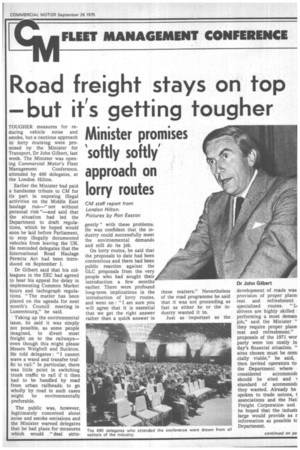Road freight stays on top but it's getting tougher
Page 45

If you've noticed an error in this article please click here to report it so we can fix it.
Minister promises
'softly softly' approach on lorry routes
CM staff report from London Hilton.
Pictures by Ron Easton
TOUGHER measures for reducing vehicle noise and smoke, but a cautious approach to lorry routeing were promised by the Minister for Transport, Dr John Gilbert, last week. The Minister was opening Commercial Motor's Fleet Management Conference, attended by 490 delegates, at the London Hilton.
Earlier the Minister had paid a handsome tribute to CM for its part in exposing illegal activities on the Middle East haulage run—" not without personal risk "—and said that the situation had led the Department to draft regulations, which he hoped would soon be laid before Parliament, to stop illegally documented vehicles from leaving the UK. He reminded delegates that the International Road Haulage Permits Act had been introduced on September 1.
Dr Gilbert said that his colleagues in the EEC had agreed to hear his appeal for delay in implementing Common Market hours and tachograph regulations. "The matter has been placed on the agenda for next month's Council meeting in Luxembourg," he said.
Taking up the environmental issue, he said it was simply not possible, as some people imagined, to divert most freight on to the railways— even though this might please Messrs Weighell and Buckton. He told delegates "1 cannot wave a wand and transfer traf fic to rail." In particular, there was little point in switching trunk traffic to rail if it then had to be handled by road from urban railheads; to go wholly by road in such cases might be environmentally preferable.
The public was, however, legitimately concerned about noise and smoke emissions and the Minister warned delegates that he had plans for measures which would "deal strin gently" with these problems. He was confident that the industry could successfully meet the environmental demands and still do its job.
On lorry routes, he said that the proposals to date had been contentious and there had been public reaction against the GLC proposals from the very people who had sought their introduction a few months earlier. There were profound long-term implications in the introduction of lorry routes, and went on : "I am sure you will agree that it is essential that we get •the right answer rather than a quick answer in these matters." Nevertheless of the road programme he said that it was not proceeding as fast as either he or the industry wanted it to.
Just as important as the development of roads was provision of proper place! rest and refreshment specialised routes. "Li drivers are highly skilled performing a most deman job," said the Minister " they require proper place rest and refreshment." proposals of the 1971 wor party were too costly in day's financial situation, " sites chosen must be COM] cially viable," he said, then invited operators to the Department where considered accommodz should be sited and standard of accommodE they wanted. Already he spoken to trade unions, t associations and the Nati Freight Corporation and. he hoped that the industx large would provide as r information as possible •tc Department.




































































































